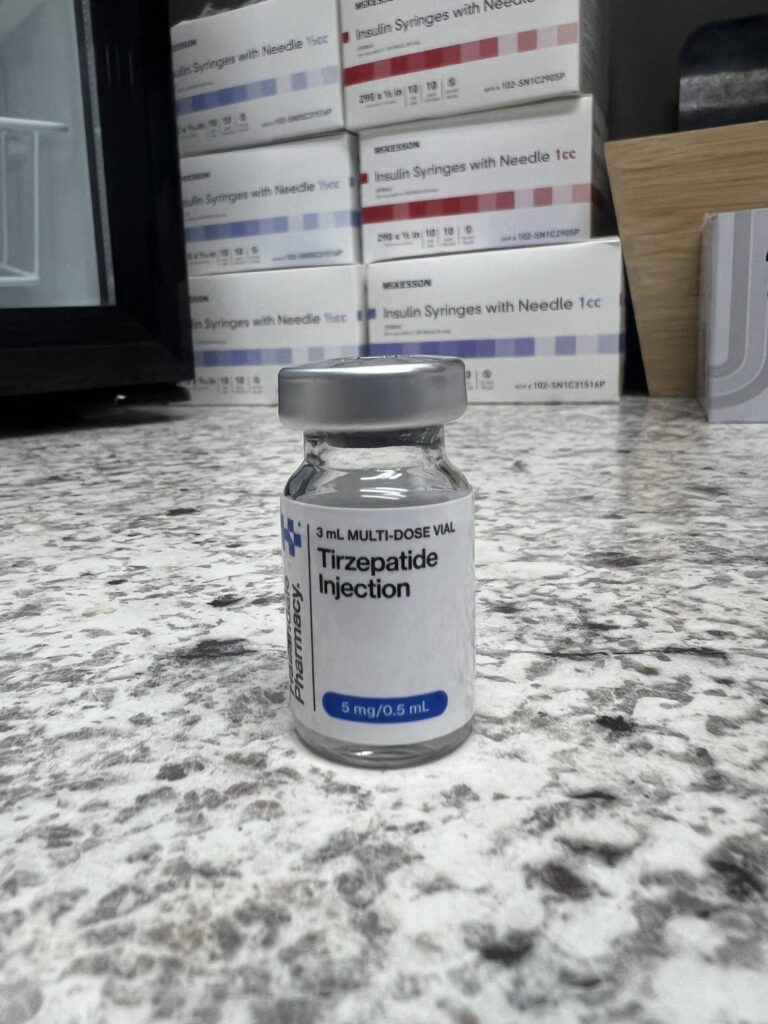
Why We Choose a 503B Pharmacy for Medical Weight Loss Injections in Wheeling
At Thrive Wheeling, your health and safety are our top priorities. That’s why we source our medications from a 503B pharmacy. But what does that mean for you?
What is a 503B Pharmacy?
Why 503B Matters to You:
3. Safety: 503B pharmacies adhere to Good Manufacturing Practices (GMP), minimizing the risk of contamination and ensuring the highest level of sterility.
4. Availability: Access to a wide range of compounded medications that may not be commercially available, tailored to your specific needs.
⚕️ Thrive Wheeling’s Commitment to Excellence: By partnering with a 503B pharmacy, we reaffirm our dedication to providing superior, reliable, and safe treatments. Your health deserves nothing less!
ABOUT TIRZEPATIDE AT THRIVE WHEELING:
Medical weight loss treatments like tirzepatide are becoming increasingly relevant in addressing obesity, a prevalent health concern worldwide. Tirzepatide, a novel therapy gaining attention, offers promising outcomes in managing weight and related health conditions.
**Understanding Tirzepatide:**
Tirzepatide belongs to a class of medications known as GLP-1 receptor agonists. These drugs mimic the action of glucagon-like peptide-1 (GLP-1), a hormone that regulates glucose metabolism and appetite. What sets tirzepatide apart is its dual action on both the GLP-1 and glucose-dependent insulinotropic peptide (GIP) receptors, enhancing its efficacy in weight management.
**Mechanism of Action:**
The drug works by promoting satiety, reducing hunger, and improving insulin sensitivity. This dual hormone action not only helps in weight loss but also contributes to better glycemic control in patients with type 2 diabetes. By slowing gastric emptying and suppressing glucagon secretion, tirzepatide helps stabilize blood sugar levels while facilitating weight reduction.
**Clinical Efficacy:**
Clinical trials have demonstrated significant weight loss results with tirzepatide. In studies, patients experienced substantial reductions in body weight compared to those on placebo or other GLP-1 agonists. This makes it a promising option for individuals struggling with obesity and its associated comorbidities like cardiovascular disease and diabetes.
**Patient Considerations:**
Before starting tirzepatide, patients undergo thorough medical evaluations to assess suitability and establish personalized treatment plans. Factors such as medical history, existing medications, and lifestyle habits are considered to optimize outcomes and minimize risks.
**Adherence and Support:**
Successful outcomes with tirzepatide often hinge on patient adherence to treatment protocols and lifestyle modifications. Healthcare providers play a crucial role in educating patients about the medication, monitoring progress, and offering support in implementing dietary and exercise regimens.
**Safety Profile:**
While generally well-tolerated, tirzepatide, like any medication, carries potential side effects such as nausea, diarrhea, and hypoglycemia. Close monitoring and patient education mitigate these risks, ensuring safety throughout the treatment course.
**Future Implications:**
As research continues, tirzepatide’s role in combating obesity and related metabolic disorders is likely to expand. Ongoing studies explore its efficacy in diverse patient populations and its long-term effects on weight maintenance and overall health.
**Conclusion:**
Tirzepatide represents a significant advancement in medical weight loss therapies, offering a potent option for individuals struggling with obesity and its complications. With its dual hormone action, clinical efficacy, and safety profile, tirzepatide stands poised to make a substantial impact in improving the health and quality of life of many patients battling excess weight and associated health risks. As with any medical intervention, consultation with healthcare professionals remains essential to tailor treatment strategies that optimize outcomes while prioritizing patient safety and well-being.


